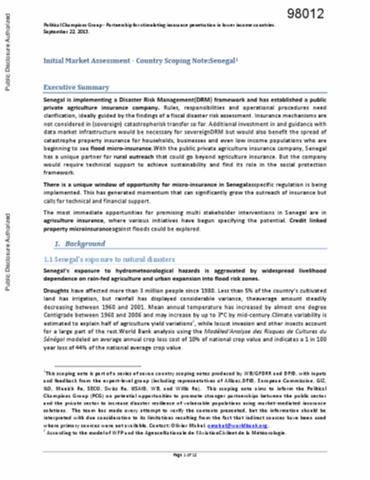The World Bank is a vital source of financial and technical assistance to developing countries around the world. We are not a bank in the ordinary sense but a unique partnership to reduce poverty and support development. The World Bank Group has two ambitious goals: End extreme poverty within a generation and boost shared prosperity.
- To end extreme poverty, the Bank's goal is to decrease the percentage of people living on less than $1.25 a day to no more than 3% by 2030.
- To promote shared prosperity, the goal is to promote income growth of the bottom 40% of the population in each country.
The World Bank Group comprises five institutions managed by their member countries.
The World Bank Group and Land: Working to protect the rights of existing land users and to help secure benefits for smallholder farmers
The World Bank (IBRD and IDA) interacts primarily with governments to increase agricultural productivity, strengthen land tenure policies and improve land governance. More than 90% of the World Bank’s agriculture portfolio focuses on the productivity and access to markets by small holder farmers. Ten percent of our projects focus on the governance of land tenure.
Similarly, investments by the International Finance Corporation (IFC), the World Bank Group’s private sector arm, including those in larger scale enterprises, overwhelmingly support smallholder farmers through improved access to finance, inputs and markets, and as direct suppliers. IFC invests in environmentally and socially sustainable private enterprises in all parts of the value chain (inputs such as irrigation and fertilizers, primary production, processing, transport and storage, traders, and risk management facilities including weather/crop insurance, warehouse financing, etc
For more information, visit the World Bank Group and land and food security (https://www.worldbank.org/en/topic/agriculture/brief/land-and-food-security1
Resources
Displaying 2196 - 2200 of 4907Assessing Low-Carbon Development in Nigeria : An Analysis of Four Sectors
The Federal Government of Nigeria (FGN)
and the World Bank have agreed to carry out a Climate Change
Assessment (CCA) within the framework of the Bank's
Country Partnership Strategy (CPS) for Nigeria (2010-13).
The CCA includes an analysis of options for low-carbon
development in selected sectors, including power, oil and
gas, transport, and agriculture. The goal of the low-carbon
analysis is to define likely trends in carbon emissions up
India : Land Policies for Growth and Poverty Reduction
In India, land continues to be of
enormous economic, social, and symbolic relevance. The way
in which land can be accessed and its ownership documented
is at the core of the livelihood of the large majority of
the poor, especially in rural and tribal areas and
determines the extent to which increasingly scarce natural
resources are managed. Land policies and administration are
critical determinants of the transaction cost associated
Initial Market Assessment
Senegal is implementing a Disaster Risk Management (DRM) framework and has established a public private agriculture insurance company. Rules, responsibilities and operational procedures need clarification, ideally guided by the findings of a fiscal disaster risk assessment. Insurance mechanisms are not considered in (sovereign) catastrophe risk transfer so far.
Mapping Carbon Pricing Initiatives : Developments and Prospects 2013
The Mapping Carbon Pricing Initiatives Report maps existing and emerging carbon pricing initiatives around the world. It does not provide a quantitative, transaction-based analysis of the international carbon market since current market conditions invalidate any attempt to undertake such an analysis. The development of national and subnational carbon pricing initiatives in an increasing number of countries calls for a different focus.
Evaluation of World Bank Programs in Afghanistan, 2002-11
Despite extremely difficult security conditions, which deteriorated markedly after 2006, the World Bank Group has commendably established and sustained a large program of support to the country. While World Bank Group strategy has been highly relevant to Afghanistan's situation, beginning in 2006 the strategies can have gone further in adapting ongoing programs to evolving opportunities and needs and in programming activities sufficient to achieve the objectives of the pillars in those strategies.







